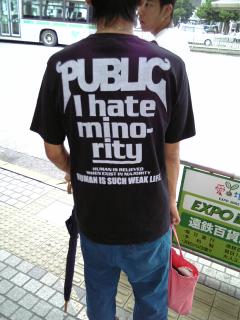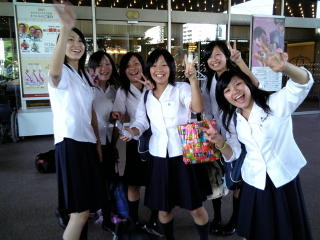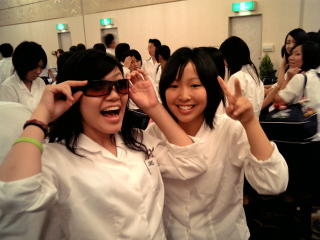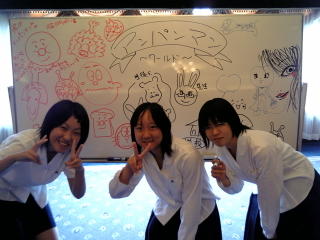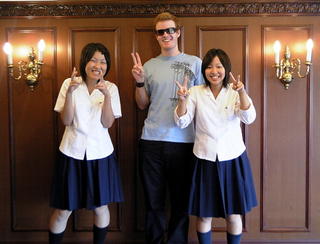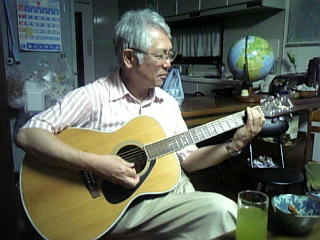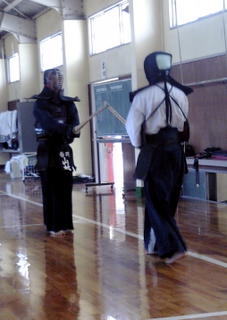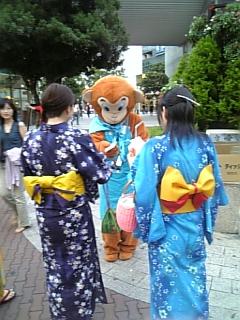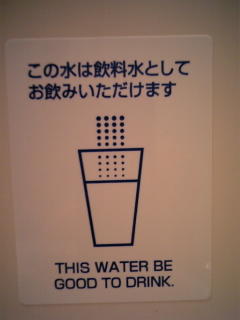
The level of annoying background noise in Japan is somewhat unbelievable, especially for a nation that is known for its politeness and civility. I'll break it down for you by outlining what you might have yelled at you or blared at you in an average day in Tokyo:
You wake up to the sounds of some ridiculously loud traditional song being broadcast over the local loudspeaker for reasons unknown OR to some sort of earthquake / fire siren, which happens so often that people just basically pretend like it's not happening because they know it's just a drill. Walking to the train station, you pass a Pachinko parlor (Pachinko is roughly equivalent to slots, for all intensive purposes in the awful noise, smoke, and generally dehumanizing effect it has on participants), which is not only decorated with outlandishly garish, giant posters and banners of giant-breasted cartoon women and hugely muscular manga action heroes, but emits an wave of cacophonous bells and rattles every time the automatic doors slide open, which - since people are going in and out all day - happens continuously.
Arriving at the train station, you have the general rush of people and the ticket machines, but, knowing that the Japanese passengers on a train are almost invariably totally silent and the train ride itself smooth, one might be tempted to relax a little; it seems you might be safe for a moment. But the noise isn't coming from the passengers, it's from the near-constant announcements over the PA system. Just on the platform, you'll hear the grating, high-pitch, recorded voice of a Japanese woman informing you when the train is arriving, that it will arrive soon, that it is arriving now (at this point you can see the train), that it is right in front of you (so you know that the train you are looking at is, in fact, a train, that you are not in some sort of non-Cartesian world of illusion), that the doors are about to open, that the doors will soon close, that the doors are now closing (oh, and there's a delightful song accompanying the process). And she will remind you to be careful to stand behind the giant yellow lines, because it turns out that you don't want to be over those, because then you'd fall off the platform and be standing on the tracks, which is, seemingly, a bad place to wait for the train.
Once you are in the train with the doors close and you have been told that the doors are closed, the train conductor begins his dialogue with you about every goddamn stop. Which wouldn't be so bad except that he has to add three sentences of meaningless polite gratitude for your gracious choice in honorably riding the train today, which - be assured - he, as well as the train service, Japan as a country and really, all of its people, feel tremendously blessed to receive. Then he'll list the names of all the connecting lines available at the next stop, tell you all about which door will open when you stop (just in case you are unable to figure that out or need a running start to the door) and affix another blessing on you and your child for having continued riding the train since he started speaking a minute earlier. This usually starts about 10 seconds after getting on the train and ends about 10 seconds before you get off, meaning that the message basically extends from each stop, so you hear it as many times as you are passing stations on your ride. (For me last year, think 10 stations a ride, twice a day, for 9 months)
When you get off the train and out of the train station, you might be in the mood for something to eat. You exit the station but trying to cross the street suddenly are forced to literally cover your ears because someone has pulled up in a van and is yelling directly into your face about your desperate need to oppose the crazy militants who would threaten the perfect peaceful society of Japan that is a beacon of hope to all nations by re-militarizing OR to get those pussies out of power that are dishonoring Japan and its rich history by standing in the way of it re-militarizing.
Entering a restaurant, there are several waiters conveniently situated around the place who immediately begin yelling いらっしゃいませ!(irasshaimase! - "welcome!") at you repeatedly from all directions until you are guided to a table, where you can enjoy hearing them yell that at each new patron as well. Finishing your meal, you are rewarded with everyone in the restaurant now yelling "thank you!" at the same time as you scuttle out the door.
If you choose to go shopping, the shop people will first yell "WELCOME!" at you and "PLEASE HONORABLY LOOK AROUND AND TAKE YOUR HONORABLE TIME ABOUT IT!" everytime they see you, and, strangely enough, every time they see each other as well. I suspect that the job training for stores in Japan requires a sort of Pavlovian training in which the employee is trained to respond to any and all stimuli with a knee-jerk "WELCOME!" (ex: New customer? "WELCOME!"; Another employee? "WELCOME!"; Stray dog? "WELCOME!"; Errant bag floating into shop on gust of air? "WELCOME!")
Deciding to just go home (after going through the train ordeal again) you might stop at the local supermarket for something to cook for dinner. Somebody is going to yell "WELCOME!" at you while walking in the door, make no mistake. And somebody is going to yell it at you while you walk the aisles. But the most insiduous thing about Japanese supermarkets (computer stores and electronics chains are the same way) is the store jingle. Some of them are full songs, but the worst are those that are only 5 seconds, as they repeat endlessly and burrow into your mind until you find yourself walking down the street singing "Bi-ku bi-ku bi-ku Bic Camera!" Case in point, I just sang that aloud unintentionally after typing it. I can also still remember the song from my local supermarket chain, Seims, from a year ago ("Everyday~ Seims, for your body and your mind...")
There are two alternatives to this: One, like me, you simply wear your headphones anywhere you go, insulating yourself completely against the outside world. Two, like most Japanese people, you are conditioned by this level of noise to develop the ability to basically block out all of the outside world. The problem seems to be, however, that this only pushes the people involved - whether it be advertisers or people demanding you hear their gratitude for your patronage - to new heights of shrill annoyance to compete for your attention. But, like my supervisor said when we were in the electronics shop for an hour listening to the jingle for the 1000th time, it's not that people aren't bothered by it, it's just that nobody ever complains.
